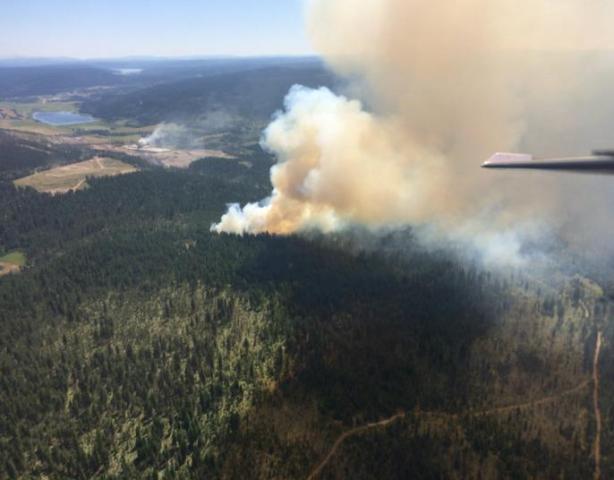Small, but steady progress has been made in combatting BC wildfires in the Northern Interior and Cariboo regions.
BC Wildfire Service Chief Information Officer Kevin Skrepnek says better weather conditions have played a pivotal role.
“We currently have 183 fires burning across the province, and that is certainly a decrease from yesterday [Tuesday]. We only had 12 new fires, something I’m very happy to report and given that is a fraction of some of the numbers we’ve been seeing; 140 new fires on Friday, nearly 100 on Saturday.”
#Gustafson wildfire, nr 100 Mile, about 5k hectares in size, #Wildwood at about 2500 and 150 Mile about 2600 ha
— My Prince George Now (@mypgnow) July 12, 2017
He says fire activity is still aggressive, but conditions this week are expected to improve, which will allow crews to continue initial attacks.
“We are expecting a continuation of hot, dry conditions across Southern BC, with the potential for some lightning in the Cariboo. It is currently looking like that lightning will have rain with it, which is certainly a positive given a lot of the new fires we responded to Friday were the result of dry lightning.”
Since April 1st, more than 600 fires have been reported, burning more than 78,000 hectares of land.
Great deal of support from fire departments around BC. 150 BC fired departments offer help, 22 deployed
— My Prince George Now (@mypgnow) July 12, 2017
Skrepnek urges residents to follow the rules and guidelines of all evacuation alerts and orders.
Many volunteers want to join firefighting efforts. BC Wildfire says the job is best left to professionals. PLS STAY AWAY FROM ACTIVE FIRES
— Shannon Waters (@sobittersosweet) July 12, 2017
Despite the decrease, several air quality bulletins are still in effect.
Provincial health authorities, including Northern and Interior Health, have issued advisories in the Cariboo and as far North as the Bulkley Valley.
Dr. Sarah Henderson with the BC Centre for Disease Control says to be careful when heading through those regions.
“Smoke is made up of gases and very fine particles that can penetrate deep into the lungs and they can irritate the lungs. They can also cause more systemic inflammation across the whole body, which can be hard on the heart and on the brain.”
Learn about wildfire smoke, air quality and health. https://t.co/72oE2TabyR pic.twitter.com/451qxTWUSv
— BCCDC (@CDCofBC) July 12, 2017
She says those with chronic illnesses, pregnant women, young children, and seniors will be most impacted by the heavy smoke, but believes a wide-range of the population of evacuees is at a health risk.
“The best thing to do is to look for air that is less smoky, create a clean air shelter in your own home, you can also look for buildings such as libraries, community centres, and shopping malls, and people can self-evacuate out of an area.”
Dr. Henderson adds to check the BC Air Quality website to see if your area is affected or under a strict advisory.
If you’re experiencing a medical emergency involving respiratory problems, you are asked to call 911 immediately.
Anyone with asthma or COPD should be careful in smoky areas. Populations most at risk have chronic conditions, pregnant women + infants
— My Prince George Now (@mypgnow) July 12, 2017
Something going on in the Prince George area you think people should know about?
Send us a news tip by emailing [email protected].






